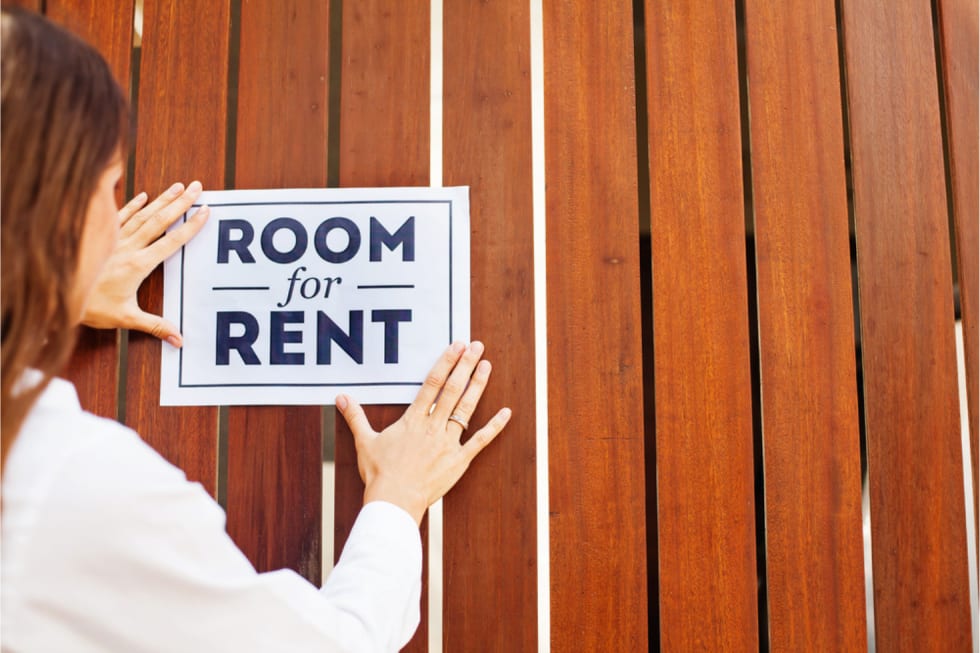- 47 units available
- 1 bed • 2 bed • 3 bed
- Amenities
In unit laundry, Hardwood floors, Dishwasher, 24hr maintenance, Stainless steel, Walk in closets + more

If you go back far enough, renting a room was something you inquired about at a local tavern when you first stopped in town. These days, your options are a bit vaster, but they still come with their own challenges. This guide is designed to navigate you through the intricacies of the modern journey of renting a room, whether you’re the tenant or the prospective landlord.
People have many reasons for wanting to rent a room, but whatever they are, this guide has a little bit of something for you.
Renting a room typically means leasing a private bedroom but sharing common areas like the kitchen, living room, and sometimes bathrooms with other occupants. It is often used when describing a situation in which one leases a room in a house that either the property owner or other tenants live in.
On the other hand, renting an apartment provides a tenant with a private living space, including a kitchen, bathroom, and living area, exclusive to themselves. This option is ideal for those who prioritize privacy and autonomy. While it generally comes with a higher cost, renting an apartment allows for more personal freedom, space customization, and the ability to set one's own rules.

Renting out a room in your property can be a great way to earn extra income and make use of unused space. But there’s a lot to know about becoming a landlord, and if you’re going to do it seriously, you should probably prepare yourself for a lot of reading and research.
However, if you just want to set up an arrangement in order to legally (and safely) lease to a close friendly or family member, and you don’t plan on becoming a landlord full-time, you should still familiarize yourself with the formal rental process. Here are key steps to be aware of:

A roommate agreement is a legally binding document that outlines the responsibilities and expectations of each person living in a shared rental property. It’s sometimes used in place of a lease when you live with roommates. However, it can also be useful as a lease addendum for preventing disputes among roommates. It typically covers a variety of topics including:
By setting clear guidelines and expectations, a roommate agreement helps prevent misunderstandings and conflicts, making the shared rental experience more pleasant for everyone involved.
If you’re interested in learning more, you can grab a roommate agreement template from us.

This section aims to guide you through various effective strategies and platforms for locating the ideal room. From leveraging online resources like dedicated roommate-finding websites and social media platforms to understanding the nuances of extended stay options and utilizing traditional methods like Craigslist, we'll explore a range of avenues.
Knowing where to start your journey in renting a room is key. Whether you’re looking to fill a room in your current residence or searching for a place to call home, these websites are invaluable tools:
Roomi is a standout choice for those seeking a secure and user-friendly platform to find roommates. It meticulously screens all listings and users, providing a layer of safety and assurance. The website's intuitive design caters especially to the needs of millennials. Creating an account, posting a listing, or searching for potential roommates on Roomi is entirely free, making it an accessible option for everyone.
SpareRoom offers a vast network of potential roommates and rooms for rent across the United States and the UK. SpareRoom is not just a platform for finding roommates; it’s a community where you can meet numerous potential roommates at once, increasing the chance of finding someone you click with. According to their website, someone finds a roommate with SpareRoom every 3 minutes.
Roomies, which claims to be the largest roommate posting platform in the U.S., is another free peer-to-peer platform that simplifies the process of renting out spare rooms or finding a room. Users can create a free account and use the platform to browse through listings and communicate directly with potential roommates, all without any cost. This platform is particularly useful for individuals who value direct and uncomplicated interactions.
Craigslist, a long-standing resource for various classified listings, remains a popular platform for finding rooms to rent. Start by selecting your desired city or region. Then, navigate to the 'Housing' section and choose 'Rooms & Shares' to view available listings. Be specific in your search by using keywords and setting your budget range. It's crucial to exercise caution: verify the legitimacy of listings, avoid sharing personal information upfront, and arrange to meet in public spaces or bring someone with you when visiting the property.
Using these websites, you can effectively search for and vet potential roommates, ensuring that you find someone who shares your living preferences and lifestyle. Remember, the key to a successful roommate relationship is open communication and compatibility, and these platforms provide the perfect starting point for building that connection.
Facebook is a solid platform to post and search for roommates. In order to use Facebook to find roommates, you have to join the right local group, so be prepared to do some social media sleuthing if you’re not local to the area.
Utilize Facebook’s wide network by joining local housing groups or community pages. These groups are often filled with posts about available rooms. You can also post in these groups detailing what you are looking for – be specific about your budget, desired location, and any preferences (e.g., pet-friendly, non-smoking). Additionally, use Facebook Marketplace to search for rental listings in your desired area.
Extended stay lodging offers a unique solution for individuals seeking temporary housing that bridges the gap between short-term hotel stays and long-term apartment leases. Extended stay hotels often provide amenities like fully equipped kitchens, laundry facilities, and sometimes even a small living area, making them a comfortable option for longer stays.
Here are some examples of extended stay lodging:
Extended stay lodgings are ideal for people in transitional phases, such as relocating for work, undergoing home renovations, or needing a place to stay for a prolonged business trip. They offer the comforts of home along with the flexibility and services of a hotel, making them a convenient and cost-effective option for longer stays.
Are you interested in considering apartment rentals as well? You might explore our listings by taking our easy quiz to get matched with an apartment that has the amenities you want in your budget and ideal location.
As a tenant, you have the right to a habitable living environment, which means your rental should meet basic structural, health, and safety standards and be in good repair. You're also entitled to privacy, meaning your landlord must provide notice before entering your space. The right to not be discriminated against in housing situations is protected under fair housing laws. Additionally, you have the right to a fair eviction process, should it ever become necessary. Always refer to your local and state laws for specific tenant rights, as they can vary significantly by location.
As a landlord, your rights include setting the rent amount, receiving rent on time, and revising the rent under the confines of the law and lease agreements. You have the right to screen potential tenants, including conducting credit and background checks. Landlords also have the right to evict tenants for valid reasons, such as non-payment of rent or violation of lease terms, following proper legal procedures. Furthermore, you have the right to enter the rented premises for specific reasons, such as making repairs or inspections, typically with advance notice to the tenant.
When searching for a room to rent, it's essential to be vigilant to avoid falling prey to scams. Here are some key guidelines to follow:
Following these steps can help protect you from scams and ensure a safer room rental experience. Remember, if a rental situation seems suspicious or too good to be true, it's important to trust your instincts and proceed with caution.
Dealing with roommate problems involves communication, setting boundaries, and sometimes mediation. Address issues directly and calmly with your roommate, discussing solutions and compromises. If problems persist, consider creating or revisiting a roommate agreement that outlines rules and responsibilities. For more severe conflicts, a neutral third-party mediator can help facilitate resolution. Remember, respect and understanding are key to resolving most roommate disputes.
If you want to move out of your room, review your lease agreement for terms regarding notice period and early termination. Typically, you need to give your landlord a written notice (usually 30 days in advance, but this can vary). If you're breaking a lease, you may be subject to penalties. Discuss the situation with your landlord to potentially negotiate terms. Ensure you leave the room in good condition to get your security deposit back and provide a forwarding address for the landlord to return the deposit.


In unit laundry, Hardwood floors, Dishwasher, 24hr maintenance, Stainless steel, Walk in closets + more
In unit laundry, Granite counters, Pet friendly, Stainless steel, Walk in closets, Gym + more